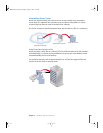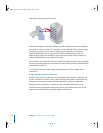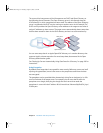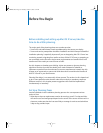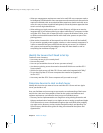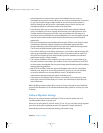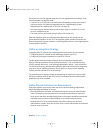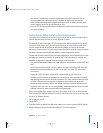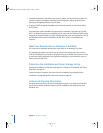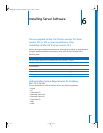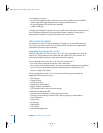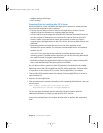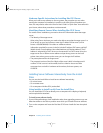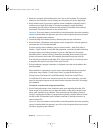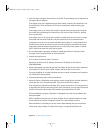
Chapter 5 Before You Begin 77
• Are there air conditioning or power requirements that need to be met? See the
documentation that comes with server hardware for this kind of information.
• Have you been thinking about upgrading elements such as cables, switches, and
power supplies? Now may be a good time to do it.
• Are your TCP/IP network and subnets configured to support the services and servers
you want to deploy?
Define Server Setup Infrastructure Requirements
The server setup infrastructure consists of the services and servers that need to be set
up early because other services or servers depend on them.
For example, If you will use Mac OS X Server to provide DHCP, network time, or BootP
services to other servers you’ll be setting up, the server or servers that provide these
services should be set up and the services running before you set up servers that
depend on those services. Or if you want to automate server setup by using setup data
stored in a directory, both DHCP and directory servers must be set up first.
The amount of setup infrastructure you require depends on the complexity of your site
and what you want to accomplish. In general, DHCP, DNS, and directory services are
desirable or required for medium-sized and larger server networks:
• The most fundamental infrastructure layer comprises network services like DHCP and
DNS.
All services run better if DNS is on the network. If you’re not hosting DNS, work with
the administrator responsible for the DNS server you’ll use when you set up your
own servers.
Setting up DHCP will reflect the physical network topology you’ll be using.
• Another crucial infrastructure component is directory services, required for sharing
data among services, servers, and user computers. The most common data you need
to share is for users and groups, but configuration information such as mount
records and other directory data is also shared. A directory services infrastructure is
necessary when you want to host cross-platform authentication and when you want
different services to share the same names and passwords.
Here is an example of the sequence in which you might set up a server infrastructure
that includes DNS, DHCP, and directory services; the services can be set up on the same
server or on different servers:
1 Set up the DNS server.
2 Set up DHCP.
3 Configure DHCP to specify the DNS server address so it can be served to DHCP clients.
4 Set up a directory server, including Windows PDC service if required.
LL2343.Book Page 77 Thursday, August 14, 2003 5:12 PM



